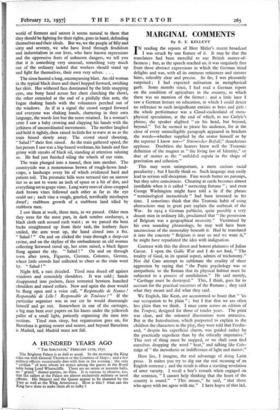MARGINAL COMMENTS
By E. E. KELLETT
IN reading the reports of Herr Hitler's recent broadcast I was struck by one feature of it. It may be that the translators had been merciful to our British matter-of- factness ; but, as the speech reached us, it was singularly free from those abstract expressions in which the German mind delights and was, with all its ominous reticences and sinister hints, tolerably clear and precise. So far, I was pleasantly surprised ; I had expected militarism in metaphysical garb. Some months since, I had read a German report on the condition of agriculture in the country, in which there was no mention of the farmer ; and a little later I saw a German lecture on education, in which I could detect no reference to such insignificant entities as boys and girls : the whole performance was a Cloud-cuckooland of meta- physical speculation, at the end of which, to use Carlyle's phrase, the speaker alighted " on his head, but beyond, beyond." Yet he seemed to please his audience, for at the close of every unintelligible paragraph appeared in brackets the words—whether supplied by the orator himself or by the reporter I know not—" Starmischer Beifall," thunderous applause. Doubtless the hearers knew well the Teutonic definition of the magnet as " the living law of Identity," or that of matter as the " unfolded copula in the shape of gravitation and cohesion."
This may seem unimportant, a mere curious racial peculiarity ; but I hardly think so. Such language may easily lead to serious self-deception. Fine words butter no parsnips, but they salve consciences. Cheating at cards becomes almost justifiable when it is called " correcting fortune " ; and even George Washington might have told a lie if the phrase " terminological inexactitude " had been invented in his time. I sometimes think that this Teutonic habit of using abstractions may in great part explain the outbreak of the War. In 1914 a German publicist, quite possibly a very decent man in ordinary life, proclaimed that " the possession of Belgium was a geographical necessity." Victimised by his own sounding phraseology, he may well have been unconscious of the immorality beneath it. Had he translated it into the concrete " Belgium is near us and we want it," he might have repudiated the idea with indignation.
Contrast with this the direct and honest plainness of Julius Caesar. I open the Gallic War and I do not find, " The totality of Gaul, in its spatial aspect, admits of trichotomy." Nor did Cato attempt to sublimate the crudity of sheer aggression by saying that " the Punic psychology was so antipathetic to the Roman that its physical habitat must be subjected to a process of annihilation." He said merely, " Carthage must be destroyed." This, I think, goes far to account for the practical successes of the Romans ; they said what they meant and did what they said.
We English, like Kent, are accustomed to boast that " 'tis our occupation to be plain " ; but I fear that we are often less plain than we think. I once came across an edition of the Tempest, designed for those of tender years. The print was clear, and the coloured illustrations were attractive. But in the Introduction, which purported to explain to the children the characters in the play, they were told that Ferdin- and, " despite his superficial charm, was guided rather by the practically expedient than by the ethically imperative." This sort of thing must be stopped, or we shall soon find ourselves dropping the word " heat," and talking like Cole- ridge of " the mesothesis or indifference of light and matter."
Here lies, I imagine, the real advantage of doing Latin prose. It makes you try to dig out the real meaning of an English sentence ; and the result is often a startling revelation of utter vacuity. I recall a boy's remark when engaged on the sentence, " I cannot help thinking that the heart of the country is sound." " This means," he said, " that those who agree with me agree with me." I have hopes of that lad.














































 Previous page
Previous page